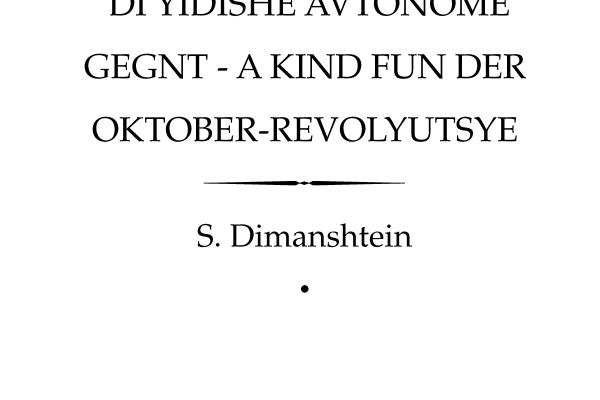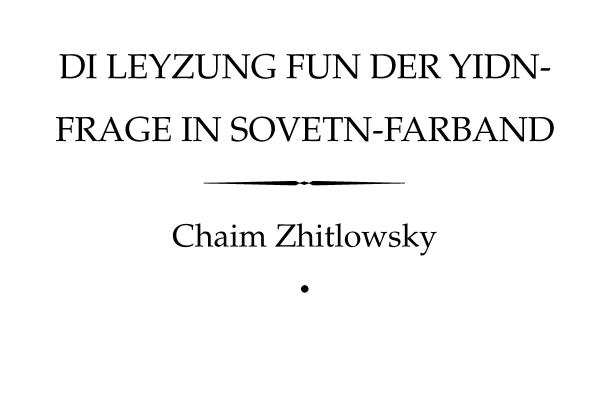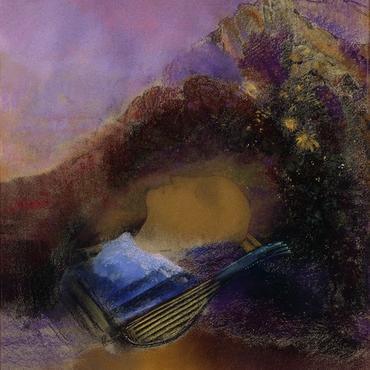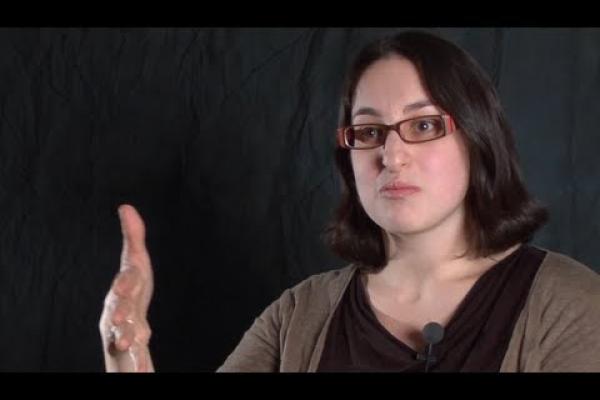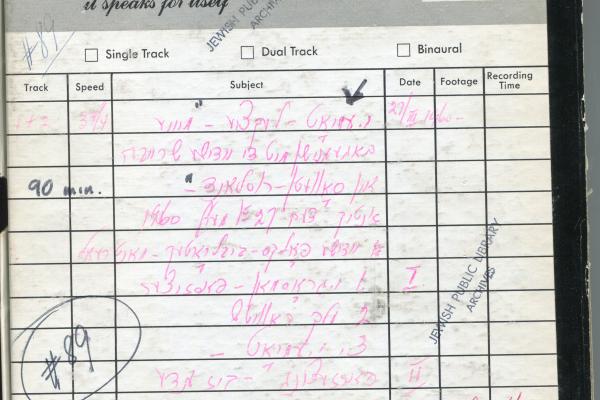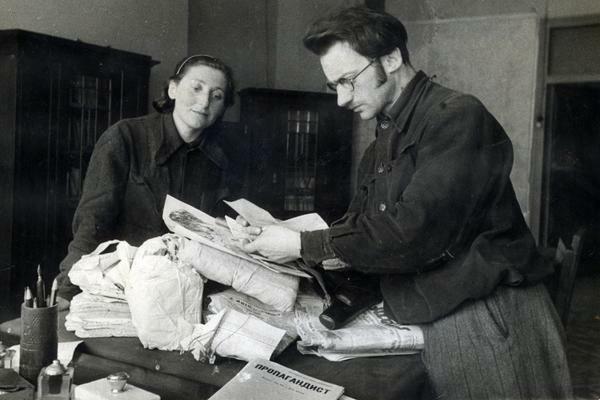Jewish Neighborhoods: Birobidzhan
In the early 20th century, Jews across geographic locations, political orientations, and religious observances proposed a variety of ways to improve the social and economic conditions of European Jewry. Some believed that Jews would be liberated by fighting for socialist revolution where they lived. Others believed that establishing a Jewish state in Palestine was the answer to antisemitism, while some advocated for establishing Jewish territories in other places under European colonial control, from British East Africa to rural Australia. But the first realization of Jewish autonomy in the modern world happened in a marshy swathe of land on the Soviet-Chinese border that was declared the Soviet Jewish Autonomous Oblast (JAO) in 1928. With Birobidzhan as its capital, the JAO promised a place where Jews could cultivate land, build infrastructure, establish schools and cultural institutions, and use Yiddish as the language of their daily lives.
The Soviet Union established Birobidzhan in the context of its broader 1920s program of indigenization, whereby it granted territories to ethnic minorities where they could cultivate and sustain their national languages and cultures within a communist framework. For many Jews both in and outside of the Soviet Union, the opportunity to build a communist Jewish autonomous zone in Birobidzhan presented a path to Jewish national liberation and a thriving Yiddish culture. Others opposed the plan, criticizing it as a misguided attempt to solve the so-called “Jewish question” by segregating Jews in a far and unknown land plagued by mosquitos, harsh winters, and poor housing infrastructure.
Nevertheless, many people were gripped by the utopian vision of Birobidzhan. Tens of thousands of Jews moved to the JAO in the 1930s and ’ 40s, primarily from the Soviet Union and Eastern Europe, as well as from Palestine, Argentina, and the United States. Thousands more followed the JAO’s progress in newspapers like the Morgen Freiheit. Birobidzhan served as a catalyst for internationalist political organizing and fundraising; in the United States and Canada, Jewish communists formed IKOR (Jewish Colonization Organization in Russia), which was dedicated to promoting collective Jewish settlements in the Soviet Union. Children at the Jewish communist Camp Kinderland even made a yearly symbolic pilgrimage to Birobidzhan. The Soviet Union encouraged migration with the slogan “To the Jewish Homeland!” and offered free one-way tickets to the region.
Jews moved to Birobidzhan for different reasons: some believed in the political vision of an autonomous socialist Jewish territory. Some were eager to connect with the land and prove false the stereotype of Jews as weak and bourgeois. Others came in hopes of improving their economic conditions or because they had nowhere else to go after the Second World War. Jews in Birobidzhan soon established a network of Yiddish schools, the Sholem Aleichem Yiddish Theater, and a Yiddish newspaper, the Birobidzhaner Shtern. For a time, children born in Birobidzhan received bilingual Yiddish-Russian birth certificates.
Birobidzhan’s potential for flourishing was cut short when, in the mid-1930s, Stalin began a series of purges that cracked down on ethnic minorities, including Jews in Birobidzhan. Struggling with both harsh living conditions and escalating Stalinist suppression, Jews began leaving the region shortly after arriving. In 1948, another wave of Stalinist crackdowns against “rootless cosmopolitanism” hit Birobidzhan especially hard. The Stalinist regime burned hundreds of Yiddish books, repressed or outright shuttered Jewish institutions, and sent essentially all of Birobidzhan’s literary class to the Gulag. Many of the victims of Stalin’s infamous execution in 1952, known as the “Night of the Murdered Poets,” had connections to Birobidzhan.
Despite the repeated challenges they faced, people have continued to find ways to ensure that Yiddish persists in Birobidzhan. During the thawing Cold War and subsequent fall of the Soviet Union, Yiddish and Jewish culture experienced a renaissance in Birobidzhan, bolstered by a renewed wave of support from both Russian and international Jewish organizations–—though a significant number of Jews left Birobidzhan during this period, too.
Today, although Jews make up less than 1 percent of the population in the JAO, it is still officially a Jewish Autonomous Region, and Yiddish is still its official language. Jewish and Yiddish culture continue to have a presence in the town; the main street is named after Yiddish author Sholem Aleichem, Jewish traditions are part of the Birobidzhan school curriculum, and between 2007 and 2008, Birobidzhan hosted a Yiddish language and culture summer program founded by Birobidzhaner and Yiddish studies professor Boris Kotlerman. Kotlerman was the editor-in-chief of the academic journal Mizrekh: Jewish Studies in the Far East, which published articles in Russian, English, and Yiddish. Jewish culture also has a presence in official media. The Birobidzhaner Shtern still publishes articles in Yiddish (including about the Yiddish Book Center’s new exhibition) and the annual Birobidzhan Literary Almanac publishes works in Russian and Yiddish from both local and international writers.
When the poet Lyuba Vasserman was interrogated by Soviet authorities in 1949, one of the central pieces of evidence in her case was a line from an unpublished poem about the Jewish Autonomous Region: “I love my country: Birobidzhan.” She was accused of nationalism, and along with most of Birobidzhan’s literary class, spent the next six years in a labor camp. Even this was not enough to disillusion her, and she continued writing poems about her love for Birobidzhan until her death. A poem written in 1968, twelve years after her release and return to Birobidzhan, reads:
I keep thinking:
“I didn’t waste my years
We started it
It’s left to them to finish
The work of their fathers
And their elderly forebearers.
All of their victories
Are still on the way.”
Many in Birobidzhan have repeatedly recommitted themselves to the work of their predecessors and enjoyed victories along the way. Some of the successes of recent decades, as well as the challenges, are highlighted in the oral history interviews we’ve recorded in Birobidzhan and beyond.
Yiddish Literary Salons at Our House in Birobidzhan
Sergo Bengelsdorf—musician, native of Birobidzhan, and son of the Yiddish poet Lyuba Vasserman—recalls the authors that frequented his childhood home.
Braving the Currents of the Bira for Summer Dances
Meri Gasymova, daughter of the famous Birobidzhan chef Yakov Blekhman, describes a park on an island in the Bira, the dances that took place there at night, and the lengths she and her friends were willing to go to to get into those dances.
What Is Rosh Hashanah? Discovering Jewish Culture at Age Twenty-Eight in Birobidzhan, Jewish Autonomous Region of the Soviet Union
Nikolai (Kolya) Borodulin, Yiddish teacher at Workers Circle who grew up in Birobidzhan, remembers when he first learned about Rosh Hashanah and how it inspired him to explore Jewish culture.
Yiddish and Jewish Culture, Passed from Children to Parents in Birobidzhan
Music teacher Liliya Valevich recounts her fascination with Yiddish speech upon arriving to Birobidzhan, and how an initiative to teach Yiddish at a Birobidzhan preschool led to children teaching their parents about Jewish culture.
“I See a Minyan Made up of the People I Buried Here”: The Keeper of the Birobidzhan Synagogue Reflects
Valeriya Bulkina, keeper of a Birobidzhan synagogue, describes the uniqueness of Birobidzhaners and of the synagogue community she’s been responsible for. She explains how after their rabbi recounted a dream to her, she began to see a minyan made up of those who had left even when those that remained numbered less than ten.
A New Look at My Home Town, Birobidzhan, the Jewish Autonomous Oblast
Ber Kotlerman, native Yiddish speaker from Birobidzhan and professor of Yiddish language and literature at Bar-Ilan University, speaks about the importance of creating a Yiddish language summer program in his hometown and a special encounter with a native Yiddish speaker in the Birobidzhan area.
Cover image is a field photo from Valeriya Bulkina's interview in Birobidzhan, Russia.



